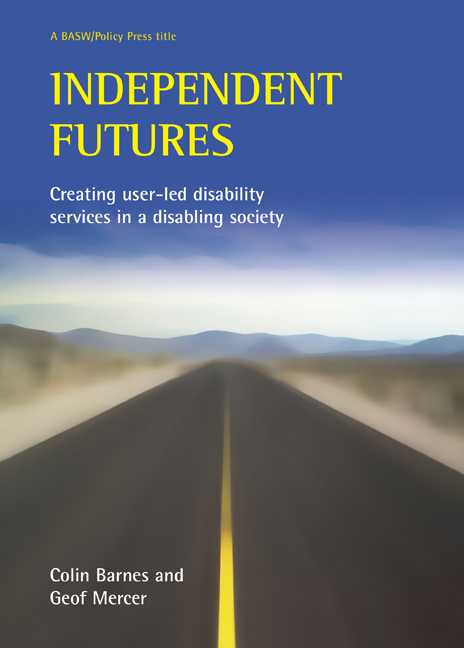Book contents
- Frontmatter
- Contents
- List of figures and tables
- Acknowledgements
- Notes on the authors
- one Examining user-led services
- two Traditional approaches: disability policy and the welfare state
- three Disability activism and the struggle for independent living
- four Researching user-led organisations
- five User-led organisations: building an alternative approach
- six Service design and delivery: opportunities and constraints
- seven Service users’ views and experiences
- eight Politics and campaigning
- nine Policy change or retrenchment?
- ten Future directions
- References
- Index
three - Disability activism and the struggle for independent living
Published online by Cambridge University Press: 15 January 2022
- Frontmatter
- Contents
- List of figures and tables
- Acknowledgements
- Notes on the authors
- one Examining user-led services
- two Traditional approaches: disability policy and the welfare state
- three Disability activism and the struggle for independent living
- four Researching user-led organisations
- five User-led organisations: building an alternative approach
- six Service design and delivery: opportunities and constraints
- seven Service users’ views and experiences
- eight Politics and campaigning
- nine Policy change or retrenchment?
- ten Future directions
- References
- Index
Summary
Introduction
Through the last quarter of the 20th century, disabled people developed a remarkable challenge to the dominant understanding of disability. It has involved the politicisation of disability with the setting up of many new grass-roots organisations around the country, the involvement of an increasing number of disabled people in campaigning activities, and the production of a crucial body of writings by disabled people and their allies advancing a socio-political analysis of disability. Moreover, these interventions have recently begun to exert a discernible impression on government thinking and policy (Barnes et al, 1999).
This chapter begins by examining the emergence of this new disability politics, with specific reference to the goal of ‘independent living’, and the development of user-led or user-controlled organisations and services. The rise in social and political protest was linked to the denial of citizenship rights and the wide-ranging experience of inequalities, and the failures of social policy to effect change. In the case of the Disabled People's Movement, the early momentum was established by campaigns around ‘independent living’. Second, we examine the specific impact on the new disability politics in Britain of a radical shift from a medical to a social model of disability – pioneered by organisations of disabled people. This stressed the social and environmental barriers to the inclusion of people with accredited impairments. In the following two sections we detail the criticism by disabled people of existing, mainstream services for disabled people, and then finally, trace specific initiatives by disabled activists to pioneer more participatory and collaborative approaches to service support and assistance, particularly user-led organisations.
Towards a new disability politics
A notable feature of the burgeoning number of protest movements emerging in the 1960s and 1970s was their location in new lines of social division and conflict. Interpretations differ about whether these were stimulated by realignments in capitalist societies, or the social and cultural dynamics of an emerging postmodern society (Touraine, 1981; Scott, 1990). What is less in dispute is that these protests included the rise of the Independent Living Movement (ILM), most prominently in the US, and the generation of a politicised Disabled People's Movement around the world.
- Type
- Chapter
- Information
- Independent FuturesCreating User-Led Disability Services in a Disabling Society, pp. 29 - 50Publisher: Bristol University PressPrint publication year: 2006

